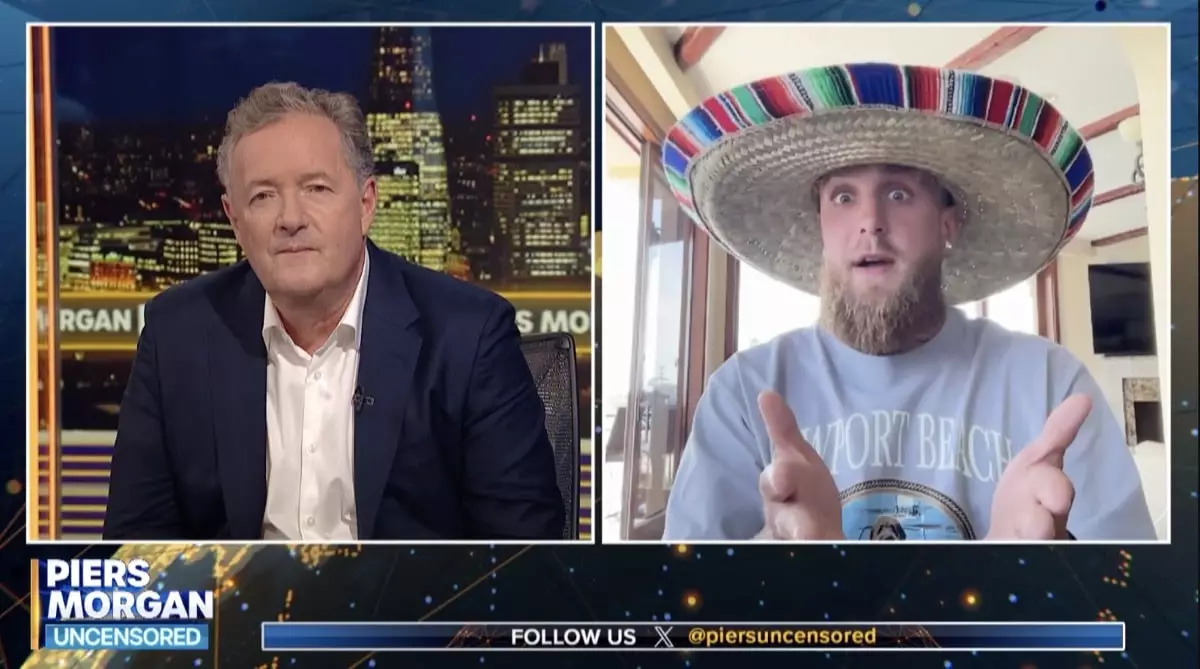In a recent episode of “Piers Morgan Uncensored,” YouTube sensation turned boxer Jake Paul found himself embroiled in a heated exchange with the veteran journalist, leading to a dramatic walkout. Scheduled to fight seasoned boxer Julio Cesar Chavez Jr. imminently, Paul’s frustration boiled over when Morgan challenged his legitimacy in the boxing world. What unfolded in that interview was not just a collision of personalities but a stark representation of the current state of boxing—where social media fame intersects with traditional sports legitimacy.
Paul’s confrontation with Piers Morgan serves as a microcosm of the broader struggles and perceptions surrounding celebrity boxing matches. The anticipation for his fight against Chavez Jr. has been significant, with attention also drawn to Paul’s previous controversial bouts, including one against boxing icon Mike Tyson. During their discussion, Morgan donned a critical lens, questioning whether Paul’s rise through the boxing ranks is warranted or merely a product of his viral fame.
The Sombrero and the Spotlight
Dressed provocatively in a Mexican sombrero during the interview, Paul’s demeanor transformed from brash confidence to palpable irritation. His emotional response is emblematic of the pressure that often surfaces in high-stakes media appearances, especially for someone like Paul, whose career is as much about entertainment as it is about sport. In his renowned bravado, he declared Chavez “easy work,” suggesting an unwavering self-belief that could either propel him to success or lead to disastrous outcomes.
What is crucial here is understanding the duality of Paul’s identity—part athlete, part entertainer. While his self-promotion can be seen as a strategic marketing move, it raises questions about the substance behind the persona. Is he genuinely formidable in the ring, or is he just an adept marketer manipulating public opinion?
The Debate on Boxing Credibility
A pivotal moment arose when Paul dismissed criticisms from fellow boxers like Canelo Alvarez and Terence Crawford, challenging them to prove their worth. This bravado could be interpreted as a tactical move; by addressing his critics with disdain, he seeks to cultivate a persona of toughness. Nevertheless, it exemplifies a troubling trend within boxing where merit is assessed not just by accomplishments but by the ability to generate headlines.
Morgan’s pushback against Paul’s dismissal of his critics reflects a growing sentiment that the landscape of boxing is shifting. In response to Paul claiming triumph over adversaries like Tyson, Morgan cautioned that he was facing a fighter nearing 60, emphasizing the imbalance in experience. Further complicating the narrative was Paul’s insistence on claiming superiority, even expressing confidence that he could best a peak Tyson—a claim that stretches credulity and raises eyebrows within the boxing community.
Reality vs. Perception in Modern Boxing
As Paul ventured to convince Morgan (and viewers) of his boxing competence, he painted himself as a “killer”—a term that evokes the gritty reality of boxing’s competitive spirit but also opens the floodgates for skepticism. Is this confidence or delusion? The tension lies in the perception of authenticity, which is often blurred when social media influencers enter traditional sports.
In a sport historically adorned with rigorous training regimens and an unyielding commitment to excellence, Paul represents a new breed of athlete, one who is as comfortable selling pay-per-views on digital platforms as he is preparing in the boxing gym. This contemporary dynamic challenges the very roots of what it means to be a boxer, particularly as Paul invites scrutiny from both fans and critics who refuse to take his claims at face value.
Future Implications for Boxing
The fallout from Paul’s interview serves to highlight a dichotomy in the boxing narrative today. On one hand, there is the significant experience and technical skills displayed by seasoned fighters; on the other, a slew of newcomers who may leverage fame over traditional credentials. Paul’s insistence on competing against well-established boxers, coupled with his desire to fight the elite (like Kanelo and Joshua), signals a shift in how we define competition in the sport.
This friction between celebrity and legitimacy underscores a larger conversation about the future of boxing. As the sport navigates these turbulent waters, the outcome of Paul’s matchup against Chavez Jr. could serve as a pivotal moment in either cementing or challenging his place in the boxing hierarchy. Ultimately, the real question lingers—will Jake Paul emerge as a legitimate boxing contender, or will his bravado crumble under the weight of seasoned opponents who understand the grind of the craft? Only time, and perhaps Saturday night, will tell.

